Position
Overview
A Bus Operator drives public or private buses. This person takes care of passengers and ensures they reach their destination safely and on time. Bus Operators check tickets and collect fares. They follow a set route and schedule, making stops along the way to pick up and drop off passengers. Safety is key, so Bus Operators must obey traffic rules and be alert at all times.
Bus Operators communicate with dispatchers to get updates about their route or any changes. They may also help passengers with special needs. Keeping the bus clean and in good condition is part of the job. Bus Operators may work long hours, including nights and weekends. They must be patient, friendly, and able to handle busy situations. This job is perfect for someone who enjoys being on the road and helping others get where they need to go.
Becoming a bus operator involves several steps, ensuring the safety and comfort of passengers. This profession requires specific qualifications and training. Here is a clear outline of the process.
First, individuals must meet the basic eligibility criteria. This often includes having a high school diploma or GED. Next, a clean driving record is crucial. The candidate must also be at least 21 years old. Obtaining a commercial driver's license (CDL) is a key requirement. This involves passing a written test and a skills test. Finally, completing a training program specific to the company or public transit authority is essential.
Here are the five steps to become a bus operator:
The journey to becoming a Bus Operator can vary. It often depends on the specific requirements set by employers and the educational path chosen. Generally, individuals can start their career with a high school diploma or equivalent. Some employers may prefer or require a Commercial Driver’s License (CDL).
Training programs range from a few weeks to several months. Programs include classroom instruction and on-the-road training. These ensure that new operators understand all safety rules and driving techniques. Passing a written test and a driving test usually finishes the training. After completing the training, new Bus Operators may start with on-the-job training. This can last several weeks or months, depending on the employer. Successful operators often gain experience and may advance to higher positions over time.
We are looking for a dedicated and reliable Bus Operator to join our team. The Bus Operator will be responsible for safely transporting passengers and ensuring a smooth and efficient bus service. The ideal candidate will have excellent customer service skills and a commitment to providing a high level of service to our passengers.
Responsibilities:
Qualifications
A career as a bus operator offers the chance to play a key role in public transportation. Bus operators drive routes, ensuring that people get to work, school, and other important places. This job means meeting new people every day and contributing to the smooth running of a community. Many operators find the role rewarding, as they provide an essential service.
Working as a bus operator has both benefits and challenges. On the positive side, operators usually work regular hours, which can help with planning personal time. Most positions also offer benefits such as health insurance and paid time off. However, the job can have its difficulties. Bus operators often face long hours sitting behind the wheel, which can lead to health issues. The need to follow strict schedules and handle the public can also add stress to the role.
To consider, the pros and cons of being a bus operator include:
Job seekers interested in becoming a Bus Operator will find a stable job market. The Bureau of Labor Statistics (BLS) reports an average of 131,900 job positions available per year. This indicates a steady demand for qualified bus operators. The BLS also projects a positive change in job openings, with an expected increase of 7.4% from 2022 to 2032. This growth suggests a favorable outlook for those entering the field.
The national average compensation for bus operators is also attractive. According to BLS data, the average annual salary is $46,280. Hourly, the average pay stands at $22.25. These figures provide a clear view of the potential earnings in this career. The compensation aligns with the responsibilities of operating buses and ensuring passenger safety. Job seekers can look forward to a decent income with room for advancement.
Aspiring bus operators can also find various opportunities for growth. Many start as entry-level drivers and gain experience. With time, they can advance to roles like school bus driver, transit bus driver, or even positions in fleet management. The job outlook and compensation figures highlight a rewarding career path for those committed to public transportation.
